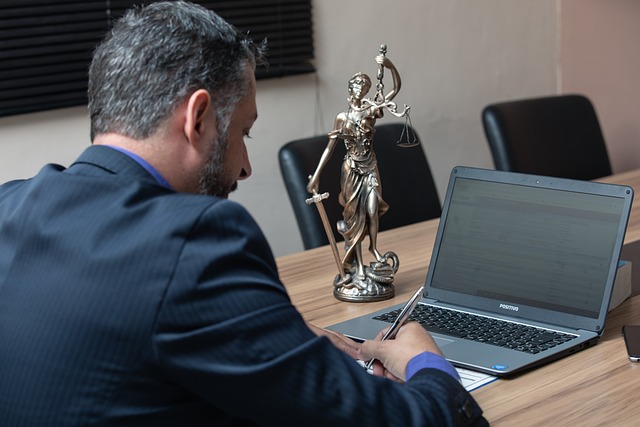Regulatory fraud laws protect financial markets and consumers from deceptive practices, balancing crime prevention with Due Process Rights in Criminal Trials. These rights ensure fair treatment for accused individuals, including informing them of charges, confronting witnesses, and asserting the privilege against self-incrimination. Evidence handling is crucial, with strict rules to maintain integrity while adhering to legal principles. Prosecutors wield power in regulatory fraud cases, balancing justice with respect for due process rights. Preventive measures like compliance and understanding due process are vital for combating fraud, fostering integrity, risk mitigation, and stakeholder trust.
In an era where regulatory compliance is paramount, understanding regulatory fraud laws is crucial for businesses and individuals alike. This comprehensive guide delves into the intricate world of these laws, exploring key aspects such as due process rights, evidence handling, prosecutorial discretion, and preventative measures like ethical business practices. By examining these elements, we provide a thorough overview to navigate the complexities of criminal trials involving regulatory fraud, ensuring justice while safeguarding accused individuals’ rights.
- Understanding Regulatory Fraud Laws: A Comprehensive Overview
- Due Process Rights: Protecting Accused Individuals
- Evidence Handling and Admissibility in Fraud Cases
- Prosecutorial Discretion and Sentencing Guidelines
- Preventive Measures: Compliance and Ethical Business Practices
Understanding Regulatory Fraud Laws: A Comprehensive Overview

Regulatory fraud laws are designed to protect the integrity of financial markets and safeguard consumers from deceptive practices. These laws cover a wide range of activities, including misrepresenting financial information, manipulating stock prices, and making false claims about products or services. Understanding these regulations is crucial for both businesses and individuals to ensure they comply with legal requirements and avoid potential pitfalls.
One important aspect to consider in the realm of regulatory fraud is the balance between preventing crimes and protecting Due Process Rights in Criminal Trials. Across the country, laws vary in their approach, but generally, they aim to strike a delicate equilibrium. By establishing clear guidelines and procedures, these laws enable authorities to investigate and prosecute fraudulent activities while ensuring that accused parties are afforded their legal rights. This balance is vital for maintaining public trust in the justice system and fostering integrity within the respective business environments.
Due Process Rights: Protecting Accused Individuals

In any criminal trial, including those involving regulatory fraud, ensuring due process rights is paramount. This concept guarantees that individuals accused of a crime are treated fairly and have certain protections throughout the legal process. It includes the right to be informed of the charges, the ability to confront witnesses against them, and the privilege against self-incrimination—essential safeguards to prevent arbitrary or unjust convictions. These principles are even more critical in high-stakes cases, where corporate and individual clients face severe repercussions for alleged violations.
Achieving extraordinary results in such legal battles demands a thorough understanding of these rights. Accused parties must be allowed to mount a robust defense, cross-examine witnesses, and access relevant evidence. This balance between upholding the law and protecting the accused is vital, ensuring that justice is not only served but also perceived as fair and impartial by all involved.
Evidence Handling and Admissibility in Fraud Cases

In regulatory fraud cases, evidence handling and admissibility play a pivotal role, especially when balancing the accused’s Due Process Rights in Criminal Trials. The rules governing the admission of evidence are crucial to ensure fairness and prevent wrongful convictions or acquittals. Courtroom procedures must safeguard against any potential bias or manipulation of facts, ensuring that only reliable and relevant information is considered. An unprecedented track record across the country highlights the evolving standards in evidence presentation, with courts continually refining practices to maintain integrity while adhering to legal principles.
Proper handling involves meticulous documentation and preservation of evidence, from collection to submission. This includes chain-of-custody protocols to verify authenticity and prevent tampering. The admissibility of digital or physical evidence must meet strict criteria, considering its source, reliability, and potential for misinterpretation. For his clients, understanding these nuances is essential to navigating complex fraud cases, as it can significantly impact the outcome of their legal battles.
Prosecutorial Discretion and Sentencing Guidelines

The prosecution’s discretion in handling regulatory fraud cases plays a significant role in shaping the legal landscape for accused individuals. Prosecutors, equipped with extensive powers, must balance their duty to pursue justice against respect for the Due Process Rights in Criminal Trials. This delicate equilibrium ensures that suspects receive fair trials while allowing prosecutors to tailor charges and decisions based on the specific merits of each case. The exercise of discretion is further guided by sentencing guidelines, which provide a framework for proportional and consistent punishment across the country.
While some might attempt to avoid indictment through various strategies, including pleading guilty or negotiating plea deals, these measures do not hinder the due process rights of the accused. In fact, they offer opportunities to mitigate potential sentences within the established legal system. The focus remains on ensuring that justice is served, and penalties are commensurate with the severity of white collar and economic crimes, while upholding fundamental constitutional principles.
Preventive Measures: Compliance and Ethical Business Practices

Preventive measures are crucial in combating regulatory fraud. Businesses should prioritize compliance with laws and regulations to safeguard against potential legal pitfalls. Ethical business practices, including transparent operations and accurate financial reporting, create a robust defense against fraudulent activities. By fostering a culture of integrity within the organization, companies can better protect themselves from internal and external threats.
Additionally, understanding due process rights in criminal trials is essential for both corporate and individual clients. For his clients, achieving extraordinary results often involves navigating complex legal landscapes while upholding ethical standards. This ensures that businesses maintain their integrity, mitigate risks, and foster trust among stakeholders, even in highly regulated industries.
In conclusion, regulatory fraud laws are a multifaceted framework designed to combat business dishonesty. By understanding these laws, from evidence handling to sentencing guidelines, we can ensure fair due process rights for all accused individuals. Preventive measures, such as promoting compliance and ethical practices, are key to fostering an integrity-driven business landscape. In navigating these complex issues, it’s crucial to remember that the balance between punishment and protection contributes to a just and effective legal system.






